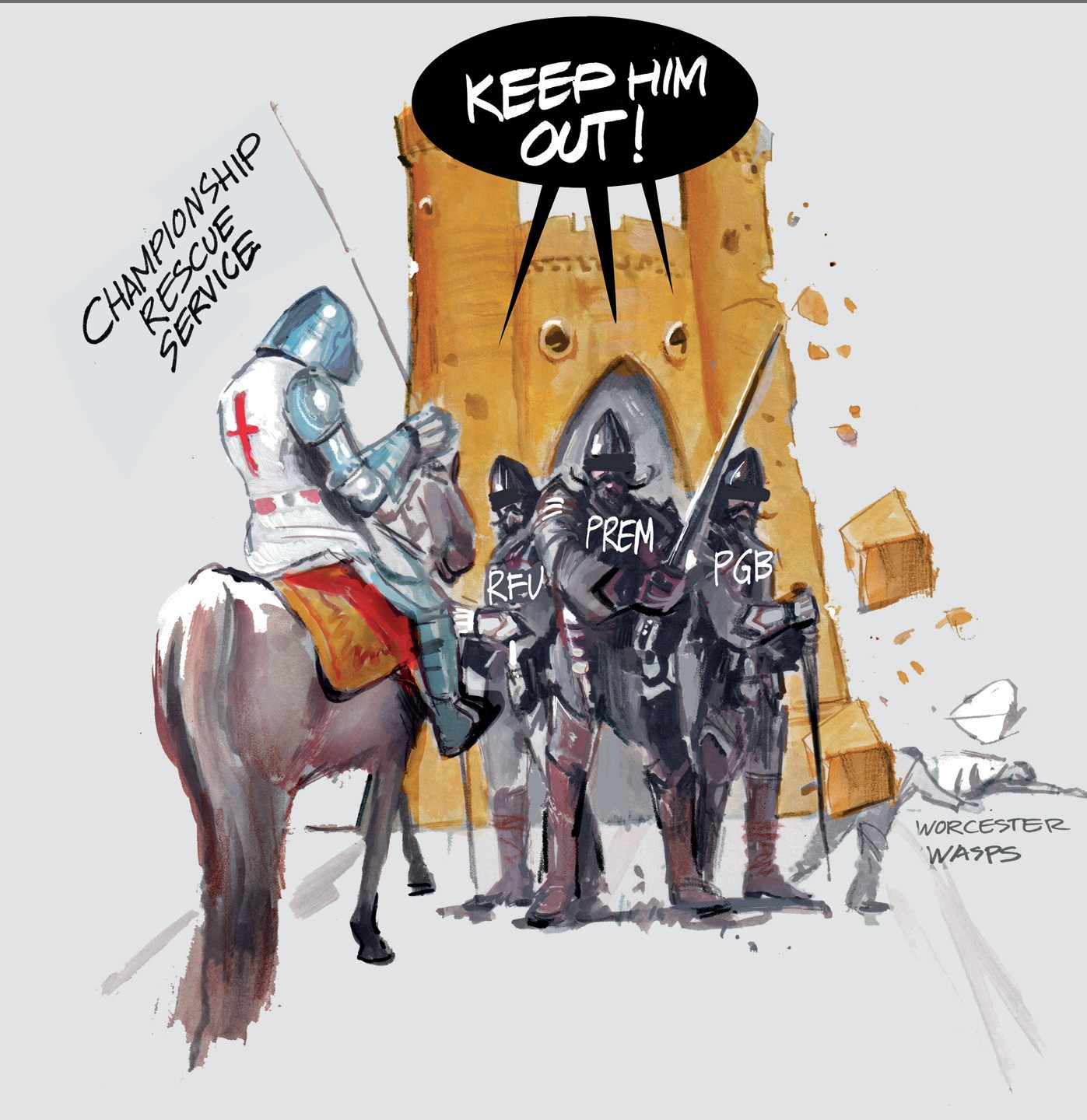
READ HIS EXPERT OPINION EVERY WEEK

The Premiership is crumbling like a house built on dodgy foundations. Worcester are in a state of near collapse, while Wasps – twice European champions and six-time English title-holders – have filed notice of their intention to appoint administrators after becoming mired in a bog of debt.
London Irish and Newcastle are in the market for new backers with their owners looking for the exit after signing off on annual accounts by admitting there was uncertainty about their operational “ability to continue as a going concern”.
There are fears that, with 30 per cent of Premiership clubs struggling to service their debts, other clubs in England‘s mismanaged elite league could soon join them.
There are those who believe that this is a tight corner that the Premiership cartel can wriggle out of despite accumulated debts of over £500 million. They are wishing on a star for a bailout cash injection from the likes of venture capitalists CVC and broadcasters BT Sport.
At the same time there has been a concerted message from Premiership Rugby and BT Sport that the league is the most entertaining, and most competitive, in the world.
The French Top 14 is far more competitive and entertaining. The Premiership claim is based mainly on the false premise that the more tries teams score, the more entertaining the league. It is a blinkered argument that fails to recognise that too many of these tries resemble Sevens-style run-ins, liberally interspersed with forward passes, against defences that may as well have hoisted the white flag. Scores like this represent the antithesis of what most rugby union fans, and players consider competitive.
The reality is that in the two seasons since the suspension of promotion-relegation by the RFU to protect the interests of the 13-team Premiership cabal, it has been semicompetitive. The picture now is of five or six clubs in the title hunt, with the chase for play-off places becoming the only truly competitive element in the league. Outside that, especially when a points gap appears between fourth, fifth, or sixth, the clubs below become also-rans.
They might raise the occasional gallop at home against opponents who, like them, are trying to qualify for a European Cup tournament in which they are rapidly becoming cannon-fodder for French, Irish, and now South African opponents. However, overall, with the threat of relegation removed, their motivation to win is neutered.
The prospect of relegation galvanises a league, especially if it involves a relatively level playing field in funding for all the competing clubs. This happens in France, and explains the burgeoning success of their league structure compared to the current Premiership fiasco, in which a protectionist policy has led to poor financial management spreading like a plague. In France every club is playing for something throughout the league season, whereas the Premiership ring-fence has led to stagnation.
The English league structure needs radical reform in the shape of a truly meritocratic promotion-relegation structure, which includes equal central funding for promoted clubs, and a solid financial framework for the Championship.
The road it must not take is the NFL style closed-shop franchise system craved by many Premiership owners. It is one in which protection for the few destroys the aspirations of the many – and results in the decline in player participation visible already.
In the Premiership’s case the ring-fence, whether by funding handicaps or the suspension of promotion-relegation, has led to the cartel’s demise. It has been compounded by the failure of the RFU, Premiership Rugby, and the PGB to apply good governance and regulation in England’s top league for many years. The latest example of this was the absence of due diligence financially and administratively on the suitability of Colin Goldring and Jason Whittingham to take over Worcester.
You might think that the penny is beginning to drop. Yet, as the Premiership limps into the new season what do we get? The hopeless PGB comes up with a proposal which is nothing more than a sugar-coated turd. It comes in the form of a bogus amendment to the minimum ground standards required for promotion which is an insult to Championship clubs.

The PGB announced last week that it would drop the minimum ground capacity from 10,001 to 5,000 for the 2023-24 season – but it came with an unworkable proviso. Championship clubs with promotion ambitions, like second-tier champions Ealing, who were denied promotion last season on ground criteria, have been told they have until January, just three months away, to meet audit stipulations.
These not only require a ground capacity of 5,000, but also demand that they have planning permission and funding to develop a ground with a 10,001 capacity for the start of the 2024-25 season. It is untenable in such a short time for a club to get planning permission and building contracts in place so soon, and Ealing are said to be considering a legal challenge. It is unknown whether other title contenders like Doncaster – the Yorkshire club who, on geographical grounds, are the RFU’s preferred promotion candidate – have filed planning applications already.
Whatever the situation, it cannot mask the double standards being operated by the Premiership cartel with the support of the RFU and PGB. Worcester, for example, have been granted a reduced capacity of 4,999 at Sixways over the past fortnight, while league leaders Sale could attract a crowd of only 4,064 to the AJ Bell for Northampton‘s visit.
London Irish had a crowd of 6,700 in the 17,800 capacity Brentford Community Stadium, and Newcastle managed 6,100 hosting Harlequins. Exeter could only summon 9,579 to Sandy Park for the season opener against champions Leicester, leaving 5,000 tickets unsold.
Fans are voting with their feet. The Premiership, in its current ring-fenced form, should be scrapped now, and promotion-relegation restored – with fair funding for promoted clubs.


British and Irish Lions
Go with your boy for the British and Irish Lions, Lawrence Dallaglio tells Andy Farrell

Latest News
Bears aim to cash in on Big Day Out
























You must be logged in to post a comment Login